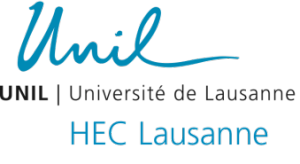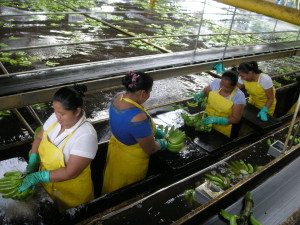Chiquita’s CSR under the scrutinity of Prof. Palazzo
GuiléAcademicAssessment: the challenge of CSR continuity in a highly competitive environment
Download the full GuiléAcademicAssessment Report: The Corporate Social Responsibility Story of Chiquita
Guido Palazzo, Professor of Business Ethics at the Faculty of Business and Economics of the University of Lausanne (HEC-UNIL), has just completed a major study on the corporate social responsibility policy (CSR) of the Chiquita company. For one year, and in cooperation with Dr. Dorothea Baur from the University of St.Gallen, he concentrated in particular on the performance of Chiquita’s sustainable development strategy by carrying out a research with external stakeholders, company workers and workers in the field, including in banana plantations in Latin America. Fondation Guilé, a Swiss organisation whose aim is to promote Social Responsibility especially among business leaders, accompanied this project. The Foundation has published a comprehensive report on the results of the study This unprecedented research has been made possible thanks to the “open book” policy proposed by Chiquita.
The study was conducted by independent researchers, who had unlimited access to internal and external sources which allowed for a meticulous and thorough study, with the aim of fully understanding the background and development of Chiquita’s CSR practices. The result is an unprecedented piece of work offering an insider’s view into the complexity of a multinational company’s CSR policy, within one of the tightest markets. The research was carried out via a tripartite governance model, in which the Fondation Guilé played the role of impartial facilitator and intermediary.
Key elements of the research:
- In the early 1990s, Chiquita began an impressive assessment of its work so that it could evolve from a multinational that did not take into account the social and environmental impacts of its activities, into a “citizens” organisation with a comprehensive commitment to its stakeholders. Despite the resulting global CSR strategy and policy, Chiquita has hardly reaped any benefits. Neither retailers nor consumers or shareholders seem to have recognised the merits of this transformation towards becoming a highly engaged company acting as a good corporate citizen.
- The fact that Chiquita has been in financial difficulty in recent years has clearly limited the scope of its possible CSR. The company has had to constantly address the problem of trying to continue to do good, while not doing well. Despite its financial problems, Chiquita has never abandoned its belief in the strategic value of its CSR policy.
- Chiquita’s controversial past and the debate on its payments to paramilitary factions in Colombia continue to haunt the company and undermine the credibility of its CSR efforts.
- Chiquita’s claim that it produces socially responsible bananas with respect for the environment without guaranteeing a minimum price, as supported by the Rainforest Alliance, has come under significant criticism from Fairtrade Organization activists, who believe that there can be no equity without guaranteed prices. Chiquita takes the market risk in most of their supplier contracts by guaranteeing the supplier a negotiated price independent of market realities. Chiquita strives to position itself as a credible producer of an equivalent alternative to Fairtrade via its CSR policy.
- Despite the fact that Chiquita was, in many respects, a pioneer in terms of protecting the environment, it sometimes faces greenwashing criticisms.
The study shows that Chiquita has made significant efforts and spent a lot of time on protecting its social and environmental commitment by anchoring it to daily and routine processes within its teams and building its CSR policy into an integral part of its corporate culture. However the viability of this strategy will be shown by its sustainability in the long term and one cannot help but wonder whether the Cutrale group, the new owners of Chiquita, and one of the world leaders in the production of oranges, will continue the CSR commitment Chiquita began more than 20 years ago. It also remains to be seen whether Chiquita’s CSR efforts can become more credible and be converted into tangible returns to the company’s stakeholders.
The study by Professor Palazzo and Dr. Baur is particularly aimed at practitioners, teachers and their students, and university researchers. Its goal: to improve the general understanding of Chiquita’s corporate responsibility strategy in order to draw lessons for other companies.
Contacts:
- Guido Palazzo, Professor of Business Ethics at the Faculty of Business and Economics
of the University of Lausanne (HEC-UNIL): guido.palazzo@unil.ch, +41 (0)79 543 04 27 - Deborah Coia, Head of Communications at HEC-UNIL : deborah.coia@unil.ch, +41 (0)79 888 27 29, +41 (0)79 888 27 29
Useful links:
- Download pictures of Prof. Palazzo and Dr. Baur
- HEC-UNIL: http://www.hec.unil.ch
Lausanne, June 5th, 2015
Press releases:
– l’Agefi- 4 Juin 2015- ” Chiquita sous la loupe de Guido Palazzo, défis de la responsabilité sociale”
– WORK Magazine – Juin 2015 – Finance durable , ” Promouvoir la responsabilité sociale”
– Tribune de Genève – 27 Juillet 2015 – ” Le plan social de Chiquita sous la loupe d’experts”



